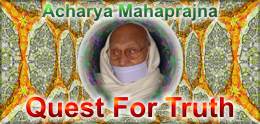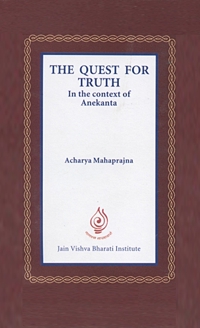
Some beings have physical experience but do not mentally perceive them. Some beings have perception but are not able to experience the sensations. Some beings have both perception and experience. The insentient neither knows nor experiences. These are tour alternative states. In the first case there is the ability to experience sensations but no perception (gyan). This is the lowest form of the sentient beings. This is the level of traits. Life can be lived at this level but consciousness cannot be developed. The other state is of pure gyan. There is no power of experience of sentiments here; there is only gyan. The medium of experience is the body. The emancipated soul does not have a body. That which does not have a body cannot experience that which is good or bad...does not come into contact with either of them.
The third state has both gyan and experience of sensations. This is the level of mental and intellectual progress. At this level there is great scope for the development of the consciousness. As our gyan increases, we are able to rise from the base level of experience and move towards widening our area of knowledge. As our knowledge base widens we begin to enter into the reality of the soul (atma). We are not able to enter into the reality of the soul till we have not been able to rise from the level of experience. In the words of Acharya Amitgati, the one without knowledge lives at the level of experiencing sensations while the wise (gyan) lives at the level of knowledge (gyan). Man lives at two levels. The gyan, who knows but does not experience it; whatever event takes place, he knows it, sees it but does not experience it, does not carry its burden.
The principle of Vedanta is that the follower should live as a viewer (drashta). Let him be witness to the event, but not influenced or involved in it. To know and not to experience is the life of a drashta. I have a piece of cloth in my hands. I know it. I can see it. I think of it as cloth. Beyond that I do not think of it. This is a life of knowledge, of observing the soul (atma-darshan). The question that could possibly arise is, "How is this observing the soul? This is merely observing the piece of cloth. How can we accept the act of observing cloth as one of observing the soul?" The answer to this is very clear. I know the piece of cloth. I simply know it but I have not established any sentimental experience towards it. This means that I know knowledge and to know knowledge means knowing oneself. Knowledge and the known are not always separate nor always the same.
Many people want to observe the soul. It is considered very difficult to do so. I am giving you a very simple method. Look at a piece of cloth. This is a method of observing your soul. But when you are observing the piece of cloth you are not doing only that. You are looking at it in relation to your own sight as well as your previously acquired knowledge where only knowledge is experienced there reality is experienced. The meaning of reality is the experience of only knowledge. As soon as any other emotion mingles into knowledge, it becomes an experience of sentiment. The ground of knowledge has slipped through. To experience only knowledge is to experience one's reality. Our existence is not separate from it. That I am experiencing knowledge means that I am experiencing that reality of the soul from which these rays of knowledge are being emanated. This is because the soul and knowledge are not different. To use only knowledge means to know oneself and to know oneself means to use only knowledge. In this context the meanings of observing the soul and of pure knowledge are one and the same. When the pure stream of knowledge is sullied with emotions of attachment and aversion, with ego and delusion, then that stream of pure knowledge becomes a stream of sentiments. This stream does not allow for the experience of the pure consciousness or for observing the soul. Knowledge and the feeling of sentiment... These two forms the background of karmavad or the doctrine of karma.
Undivided Bengal had twenty four Parganas, towns (zillas). There, among them is a village called Kolhu. A man lived there whose name was Bhupesh Sen. This Bengali gentleman was such a great devotee that when he sat in devotion he would become totally immersed in it. His relationship with the outside world would snap. One day when he sat immersed in devotion with the worldly ties snapping, his inner world was all illumined and active while the outer world was totally quiet. One man came and shouted, "Bhupesh what are you doing? Get up and take charge." He shouted very loudly. But Bhupesh just did not hear. Then shaking him physically, he made Bhupesh open his eyes. "Tell me what happened?" asked Bhupesh. The man said, "You are asking me? You sit here closing your eyes! Do you not know that your one and only son has been bitten by a snake and he succumbed to it instantly." Replied Bhupesh, "That which had to happen, happened." Said the other man, "Oh dear what kind of father are you? I gave you such bad news and you are sitting as though nothing has happened. Looks like you have no affection for your son. So you do not feel any grief. Why are you not worried? Why are you not sad? Why are there no tears in your eyes?" Bhupesh replied, "The day my son came into this world, he did not do so after taking my permission-today he has returned; he has done so again without asking me. On the day of his birth I did not do anything; today also it is not for me to do anything. This is a necessary cycle of birth and death; I have no role to play in it. Man comes and goes. Why do you worry so much?" The other man became quiet. He had nothing more to say. After a few moments of silence he said, "Come his funeral pyre has to be lit." Bhupesh went along. Lighting the pyre at the cremation grounds, the father said, "Oh my son, may you return from where you came. From today our relationship is over."
This is sheer knowledge of the event. It is not experiencing of sentiment. That which happened was seen only as it happened. When man reaches this stage, then his form as a gyan (or the knowing one) comes to fore. In Mahavira's words this is called samvar. Where there is only knowledge, experience of only the soul, there the attraction of karmic particles towards the soul is inhibited.
 Acharya Mahaprajna
Acharya Mahaprajna


